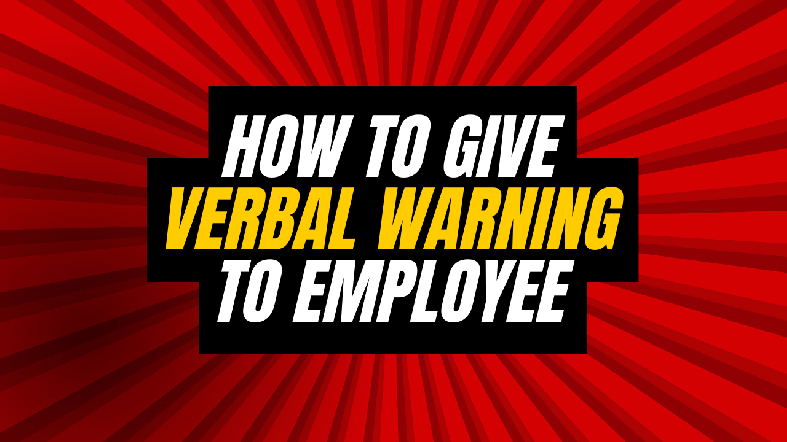
How To Give Verbal Warning to Employee
Are You Hiring?
Find candidates in 72 Hours with 5+ million talents in Maukerja Malaysia & Ricebowl using Instant Job Ads.
HIRE NOW
A workplace consists of many different types of people with unique personalities, behaviours and ways of thinking. It is inevitable that, sooner or later, conflicts will arise. But this does not mean that these conflicts cannot be handled with respect towards each other and demonstrates professionalism.
A verbal warning is when an employee is verbally informed by the employer to change or improve their behaviour, way of working or actions in the workplace. If it's not improved or taken seriously, the employer must take further action. There are two types of verbal warnings. The first one is a formal verbal warning, and the second one is an informal verbal warning.
An informal warning can be as straightforward as a quick chat between the employer and the employee or manager. This can help when solving minor issues or unsatisfactory performance. While in the case of a formal verbal warning involves proceedings. This can include a disciplinary investigation and hearing.
Below are some of the most common cases where a verbal warning is necessary:
- An employee is always late for work
- An employee is consistently absent from work
- The personal appearance of the employee is not up to standard or looks professional
- An employee fails to cooperate with work colleagues
- An employee has used company equipment for personal purposes
- An employee consistently makes mistakes in their work
- An employee struggles to handle their workload
- An employee is unable or unwilling to follow instructions.
These are some of the critical points for employers to consider when issuing a verbal warning at work:
1. Making sure that the verbal warning is necessary
An informal verbal warning is appropriate when the employee has made a one-time mistake. In contrast, if they have committed serious offences or their responsibilities have been compromised or poorly executed for a significant time, a verbal warning might not be suitable. It is best to make a written warning instead.
2. Ask yourself, "Is this employee of mine struggling?"
The superior, line manager or employer should meet with the employee and see whether or not some deeper reasons have caused them to struggle in their role. Employers or superiors must cultivate empathy so employees feel understood and cared for. Good work culture tends. And when everyone cares for each other's well-being, productivity will increase as everyone in the company feels motivated, understood and well taken care of.
3. Use verbal warning as an opportunity to give constructive criticism and advice
A verbal warning does not have to be heated and volatile. It can be calm and constructive as long as the employer knows how to translate the notice respectfully. Most of the time, the message is not the problem. It's how we say it. Let's say it respectfully and calmly, and give advice, most of the time. People can actually accept it and even find it motivating!
4. The verbal warning should be documented
A written warning based on a verbal warning within a reasonable period must be executed. This is important evidence of the warning and the points expressed in the meeting.
5. Keep a record of verbal warnings
The employers or line manager needs to keep a written record of the disciplinary action to show that they have carried out their duties as responsible leaders.
6. Be clear about what the employee needs to improve
The employee needs to make clear the points made during a verbal warning. Therefore, it helps to write out the key points of the meeting. This will help the employer to remain focused on what needs to be improved instead of the verbal warning turning or swaying into an argument.
7. Deliver the verbal warning professionally
It is crucial to remember that verbal warnings should be carried out professionally. Avoid raising your voice, being aggressive or using aggressive language.
8. Make a written record of the verbal warning
Within an appropriate period, the employer should follow up with the employee. Observation should be made on whether or not the employee has made some progress and improvements. If no improvement is made, the employer might consider taking disciplinary action further. Written record or letter of the verbal warning should consist of the following:
- The outcome of the disciplinary hearing
- What type of disciplinary action has the employer decided to take towards the employee
- What are the consequences for the employer if the verbal warning is not taken seriously or if the misconduct or underperformance continues
- What are the changes in behaviour or work ethic that needs to be improved by the employee
Visit the HR Library to acquire all relevant HR resources.
Contact here for more information on hiring employees.


